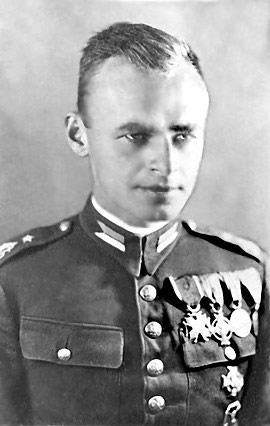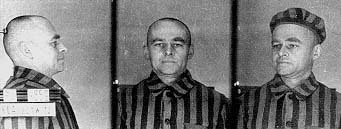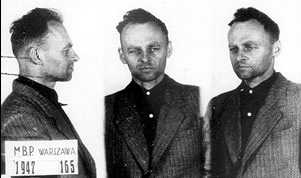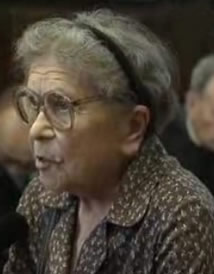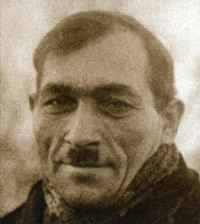 |
Above: Staff Sergeant Piotr Smietanski, Polish secret police, the Urzad Bezpieczenstwa, nicknamed "The Butcher of the Mokotow Prison". [6] Piotr Smietanski executed Witold Pilecki with a single shot to the back of the head. Piotr Smietanski emigrated from Poland to Israel after 1968. His d.o.b. is believed to be 1921, but nothing is known about his childhood, nor about his whereabouts during the II WW. It is believed that Smietanski was paid around 1,000 Polish Zloty for each execution he carried out.
Among hundreds of other soldiers of the Democratic Underground murdered by Smietanski were those executed on March 7, 1949:
- Capt. Stanislaw Lukasik "Rys"
- 2 Lt. Roman Gronski "Zbik" - Lt. Jerzy Miatkowski "Zawada" - Lt. Tadeusz Pelak "Junak" - Lt. Edmund Tudruj "Mundek" - Lt. Arkadiusz Wasilewski "Bialy"
Executed by Smietanski on February 8, 1951 were:
- Maj. Zygmunt Szendzielarz "Lupaszko"
- Lt. Col. Antoni Olechnowicz “Pohorecki” - Lt. Lucjan Minkiewicz “Wiktor” - Lt. Henryk Borowski “Trzmiel” |
Captain Witold Pilecki, one of the greatest heroes in the history of the world ,he could not be broken, and was as perfect in Godly virtues as a man or woman could possibly be.
His story fell on deaf ears not wanting to hear .The evil of their doing was eventually to haunt the whole world as at this time.
by Edward Yablonsky originator of this blog
https://archive.org/stream/WITOLDREPORT/WITOLD%20REPORT#page/n11/mode/2up
http://www.doomedsoldiers.com/volunteer-to-Auschwitz.html
"The Cavalry Captain, Pilecki, is one of our nation's foremost heroes, whom all military men ought to salute […] We are no better than the Germans and Russians, for by our own hands, we were capable of murdering our own heroes”.
|
Remembering Unsung Heroes Of The Holocaust
01/02/2013 - 05:49
image: http://www.thejewishweek.com/sites/default/files/images/2013/01/images.jpg

Witold Pilecki: His burial place isn't known, his heroism is.
Associated Press reported recently on some excavations in Warsaw that have received little interest outside of Poland, especially in the Jewish community.
The work at the Powazki Military Cemetery should be of interest to Jews – the forensic scientists are looking for the remains, in a mass grave that contains entangled skeletons of resistance fighters, of one particular hero. Capt. Witold Pilecki, a non-Jewish Pole, volunteered to be captured and interned in Auschwitz in order to bring the Nazi death camp’s atrocities to the attention of the world.
“He was unique in the world,” his daughter, Zofia Pilecka-Optulowicz, told AP. “I would like to have a place where I can light a candle for him.”
Until now, no one has been able to identify the remains of Pilecki, whom AP called “the only person known to have volunteered for Auschwitz.” He was able to escape from Auschwitz in April 1943, when he realized that the SS might uncover his undercover activities. He rejoined Poland’s Home Army resistance force, fought in the citywide 1944 Warsaw Uprising, was arrested in 1947 by the communist secret security; falsely accused of planning to assassinate dignitaries, he was executed in 1948. Pilecki numbered among a small group of individuals who entered the Third Reich’s killing fields of their own volition to shock the conscience of the world.
In the early days of the Third Reich, when political cabarets were still open and comedians – most of them non-Jewish, by that time – still dared to taunt the regime, one comedian in Munich, speaking of the nearby Dachau concentration camp, spoke of the site, which was known to the crowd. “Most impressive and well protected,” he said. “The walls are ten meters high, with barbed wire along the top, electrically charged, and machine gun towers at every corner – still, I only have to say a word or two, and I’ll be inside in a jiffy.”
Getting inside a Nazi concentration camp or ghetto was easy. It happened to millions of people, against their wills. Going inside voluntarily, then getting out, then risking one’s life to talk about it – that was hard.
In recent weeks, I’ve read books about three such people. “The Auschwitz Volunteer: Beyond Bravery,” a biography of Pilecki. “The Man who Broke into Auschwitz,” the story of Denis Avey, a British soldier in a POW labor camp near Auschwitz who also put himself in harm’s way to serve as a witness. And “Karski: How One Man Tried to Stop the Holocaust,” about Jan Karski, a Polish diplomat, who arranged to step inside the Warsaw Ghetto.
All three men managed to return to freedom, and to tell their horrific stories – which often fell on deaf, often-unbelieving ears. All three books are suspenseful, inspiring, recounting bravery that few of us can imagine.
At the end of a report that he put together in 1945, Pilecki stated that “What I have written … in these few pages is unimportant, especially for those who will read them just for thrills.”
On the contrary, his words are of extreme importance to Jews and to any other community that suffered at the hands of the Nazis.
If the excavations at the Warsaw cemetery are successful, the people who owe an eternal debt to Pilecki’s memory will have a site where they can properly honor him.
Yale University historian Timothy Snyder and David Marwell, director of the Museum of Jewish Heritage – A Living Memorial to the Holocaust, will discuss “The Auschwitz Volunteer” at the museum on Jan. 9 at 7 p.m. (646)437-4202.
Read more at http://www.thejewishweek.com/blogs/yad/remembering-unsung-heroes-holocaust#Vabc4v0IhJiQIxeG.99
The Murder of Cavalry Captain Witold PileckiPreface: Slav and Jew
The history of the Jews, since the Diaspora, had been almost 1900 years of mixed tolerance and persecution. A stateless people, desiring settlement, but necessarily adapted to the prospect of being driven from their homes, or extorted with the threat of same, formed an international network of mutual support and occasional refuge. Poland, where they found refuge from persecution throughout the Europe, was actually very receptive to their presence save for the buffeting times of the Reformation, Counter-Reformation and Inquisition - when the geopolitics of "religious cohesion", (Cuius religio, eius religio; Whose religion, his religion - i.e. the monarch determined the religion of the people) came intensely into play. With the onset of The Enlightenment, general tolerance and good will returned in Poland and the Polish territories outside of Russia. The opening of WW II saw 3 million Jews residing and often prosperous in Poland. To be sure there were Nazi collaborators in Poland, as in every country the Nazis overran. In the main, however, Polish response ranged from self-protective hunkered down separation to quiet, but dedicated support in harboring and transporting Jews to safer environs south and east of the German occupied territories - at great risk to those who helped and their families.
| |||||||||||||||||||||||||



